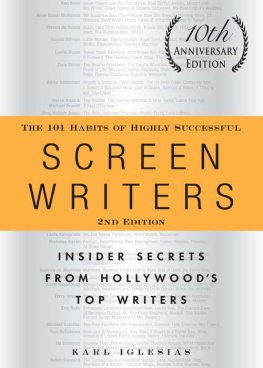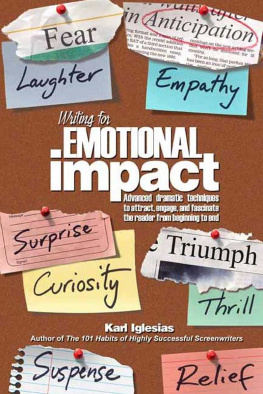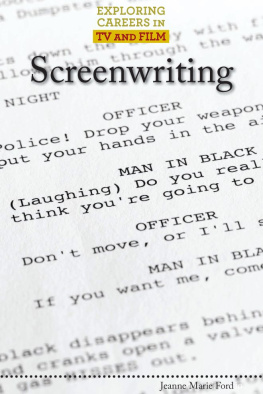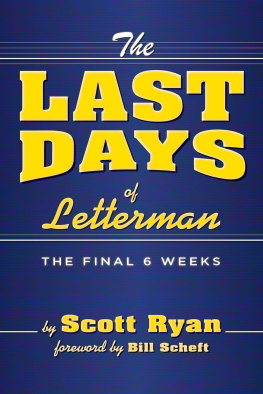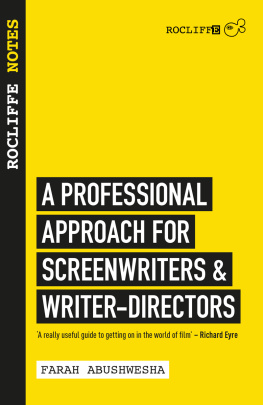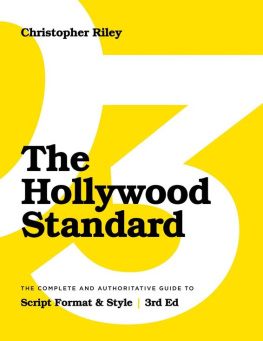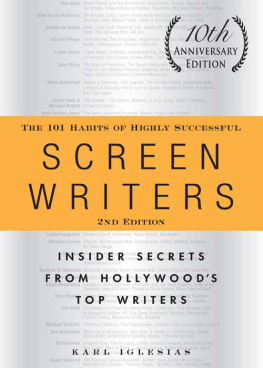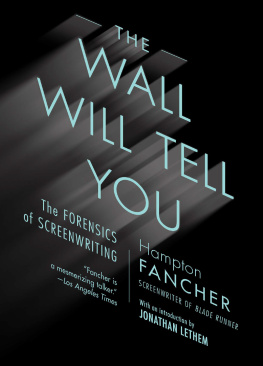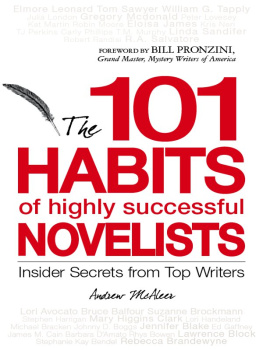To all aspiring screenwriters who sacrifice so much to share their souls through the screenplay.
May these 101 habits be the seeds that inspire your next masterpiece.
Printed in the United States of America.
This publication is designed to provide accurate and authoritative information with regard to the subject matter covered. It is sold with the understanding that the publisher is not engaged in rendering legal, accounting, or other professional advice. If legal advice or other expert assistance is required, the services of a competent professional person should be sought.
ACKNOWLEDGMENTS
While most of the words in this book belong to the screenwriters interviewed for this project, it is clear where my appreciation lies. First and foremost, a heartfelt thank you and deep appreciation must go to those twenty-two screenwriters for granting me their time and energy despite their hectic Hollywood schedules, and for their willingness to share their knowledge and experience with the reader. They are, in alphabetical order: Ron Bass, Steven de Souza, Gerald DiPego, Leslie Dixon, Tony Gilroy, Akiva Goldsman, Derek Haas & Michael Brandt, Amy Holden Jones, Laeta Kalogridis, Nicholas Kazan, Jim Kouf, Andrew W. Marlowe, Bill Marsilii, Aline Brosh McKenna, Scott Rosenberg, Terry Rossio, Eric Roth, Michael Schiffer, Tom Schulman, Ed Solomon, and Robin Swicord. Your insightful comments are the soul of this book.
Special thanks to Victoria Sandbrook and Jennifer Lawler for their helpful comments and editorial support.
And to my friends and family, especially Tara, Allie, and Aaron, for their caring and support.
HABIT n. 1. a. A recurrent, often unconscious pattern of behavior that is acquired through frequent repetition. b. An established disposition of the mind or character. 2. Customary manner or practice: a person of ascetic habits. 3. An addiction.
T HE A MERICAN H ERITAGE D ICTIONARY OF THE E NGLISH L ANGUAGE , T HIRD E DITION
The secret to success in any field is to find what successful people do, think about and act on, and do the same.
A NTHONY R OBBINS
INTRODUCTION
FADE IN
We are what we repeatedly do. Excellence, then, is not an act, but a habit.
A RISTOTLE
Despite the old adage attributed to William Goldman, Nobody knows anything, theres one thing every studio executive knows for sure: It all starts with a great script.
But most scripts are terrible, mediocre, by the numbers, or almost good, which means that in order to feed the industrys ravenous appetite, executives are desperately looking for great material.
If you want something youve never had, you have to do something youve never done!
K IMNESHA B ENNS
The problem isnt craft. Its the temperament of aspiring writerstheir traits, skills, talents, and habitsthat keeps them from writing great screenplays. It may sound harsh, but the sad truth is that more than half of the scripts currently making the rounds in Hollywood were written by writers who have no business being screenwriters. Sure, everyone goes to the movies and knows when theyre good or bad, and everyone has access to a computer with which to write their screenplay. But think about this: Everyone can recognize a funny joke, but can everyone create one thats as funny and has never been told before?
Theres a multimillion-dollar business devoted entirely to giving outdated prescriptions, rules, and formulas to aspiring screenwritersin an industry that frowns on formulas. Aspiring screenwriters are willing to pay anything to get that magic key that will open the door to a spec sale that will instantly change their lives. (A spec script is a screenplay written without pay, on speculation that it will sell to a producer or get representation by an agent.)
One hasnt become a writer until one has distilled writing into a habit, and that habit has been forced into an obsession.
N IYI O SUNDARE
In order to write a great script, you have to be a real screenwriter because, like an aged wine, it takes time and hard work to develop the necessary craft to write great scripts. You cant just be a fly-by-night hack, dreaming of the big score.
Winners have simply formed the habit of doing things losers dont like to do.
A LBERT G RAY
The difference between successful screenwriters and unsuccessful screenwriters is that successful screenwriters do all the things that unsuccessful ones want to do but cant do or dont know how to do. Modeling what works is the philosophy at the heart of every masterapprentice craft. Why not screenwriting? Someone is doing it rightmany are, in fact. Why not ask them how they do it? Hey, successful screenwriter dude, what are your habits? What works for you? Enlighten me.
If I wanted to become a tramp, I would seek information and advice from the most successful tramp I could find. If I wanted to become a failure, I would seek advice from people who have never succeeded. If I wanted to succeed in all things, I would look around me for those who are succeeding, and do as they have done.
J OSEPH M ARSHALL W ADE
The focus of this book is not on how to write a formulaic script but on what it takes to become the writer who creates a unique one. In other words, on the habits and traits that increase the odds of your writing a great scriptand also developing a successful career as a screenwriter.

